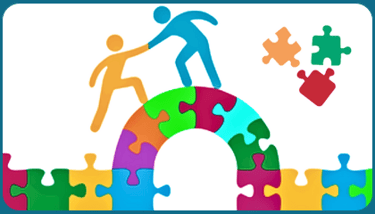Flyers and Materials
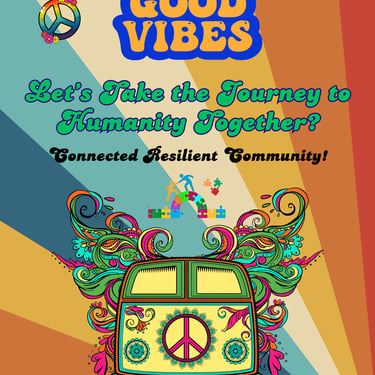
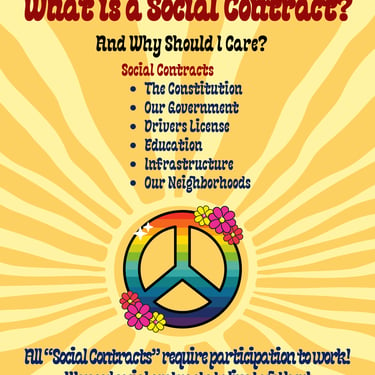

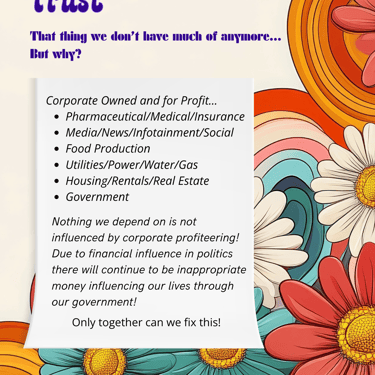

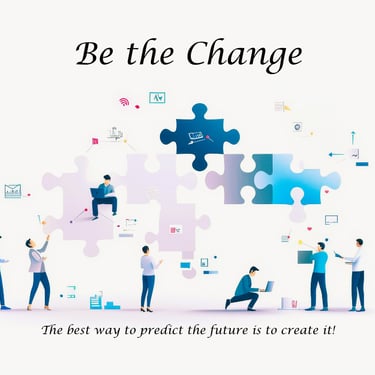
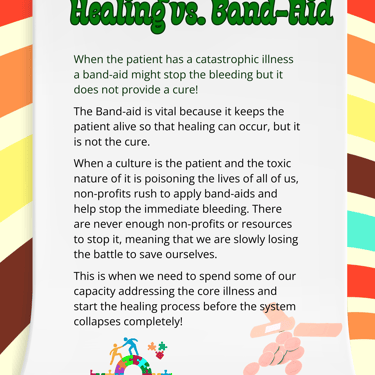
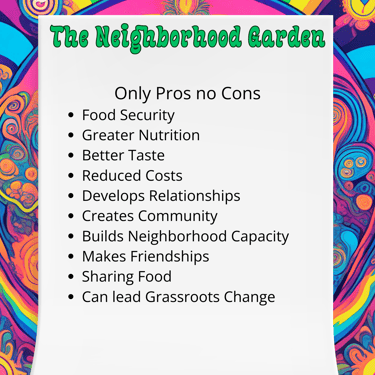
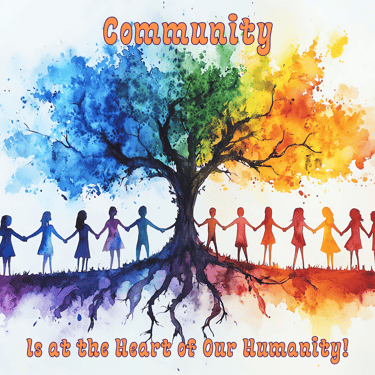
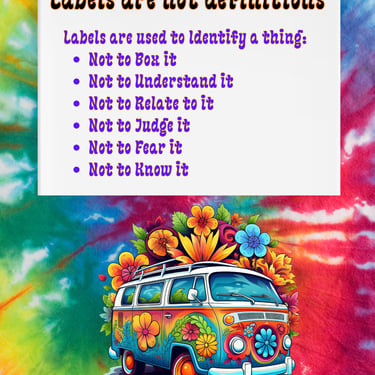
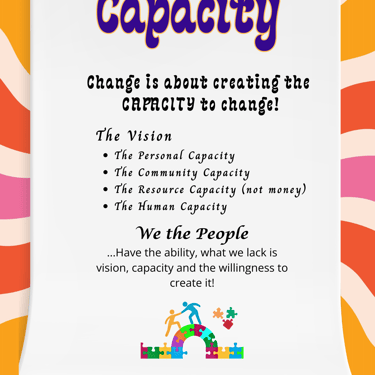
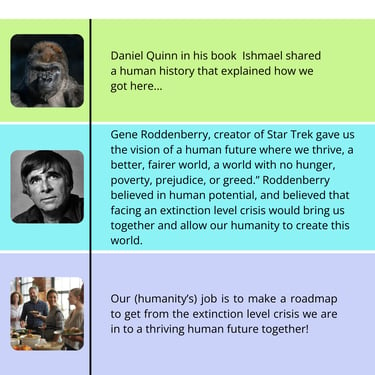
The Resilient Community Movement
In an increasingly complex world, the essence of our survival hinges on the cultivation of human relationships and effective communication. Franklin D. Roosevelt emphasized the importance of fostering connections among diverse peoples to coexist peacefully. To address the challenges of today and the future, we must unite and take charge of our local ecosystems, ensuring they serve our collective needs. While finding common ground may seem simple, it is often a daunting task in a culture marked by divisiveness. This is where resilient ecosystems play a vital role, providing the necessary tools and support to bridge those divides. By working collaboratively with communities, we can establish shared goals that foster unity and resilience, ensuring that we not only survive but thrive together in harmony.
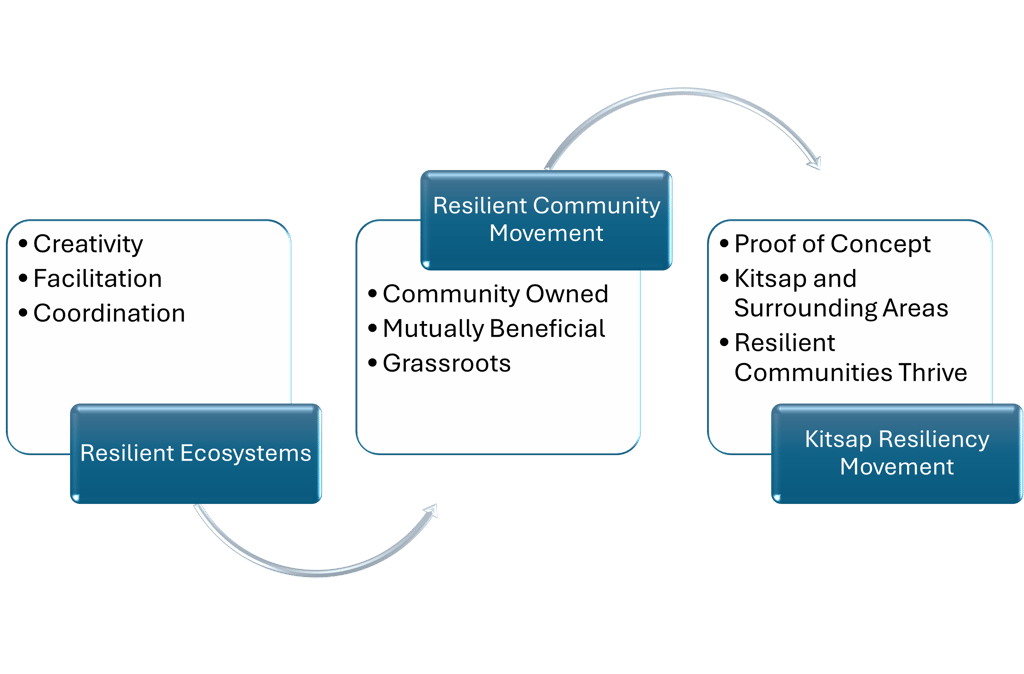

Human Projects
Resilient Ecosystem's aim is to foster connected and vibrant neighborhoods, empowering communities through grassroots movements that drive meaningful change in the human condition. While the overarching goal is long-term transformation, we recognize the importance of shorter-term projects that engage and focus our efforts.
These initiatives prioritize human needs, ensuring security and stability, which in turn allows for the cultivation of generational work. By addressing immediate concerns, we create a foundation that supports broader social and environmental goals, paving the way for sustainable development. These projects not only provide essential resources but also encourage community participation, fostering a sense of ownership and collaboration among residents. Ultimately, this dual approach strengthens both the immediate community and the long-term vision for a resilient future.
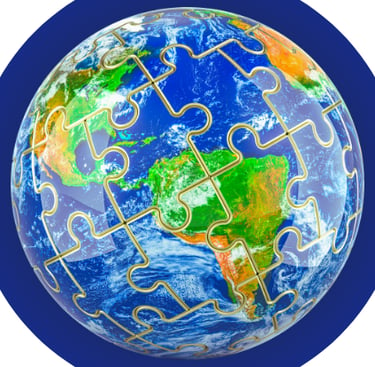

Community 4 All
When disaster strikes, it often serves as a catalyst for humanity to unite, forming networks of support that illustrate our innate capacity for compassion. In these moments of crisis, the true essence of human nature shines through, countering the negative stereotypes often attributed to it. We are not just isolated individuals but part of a diverse community that thrives on connection and shared experiences. Instead of succumbing to the superficial ideologies of community that society often presents, we must recognize our fundamental human traits that bind us together. Embracing this perspective allows us to cultivate the skills necessary to foster genuine relationships and appreciate the commonalities we share, which far outweigh our differences. It is time to shift our focus toward building an inclusive community that celebrates our interconnectedness.


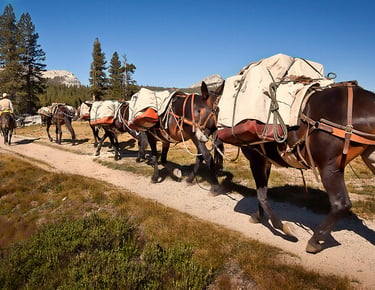


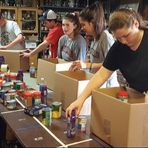
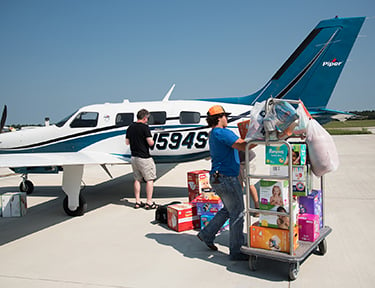
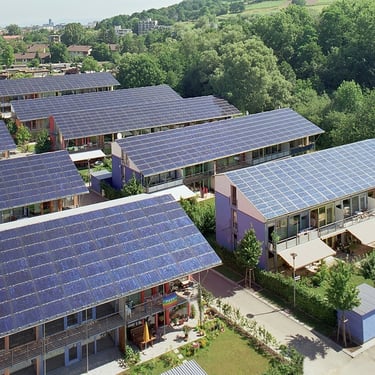

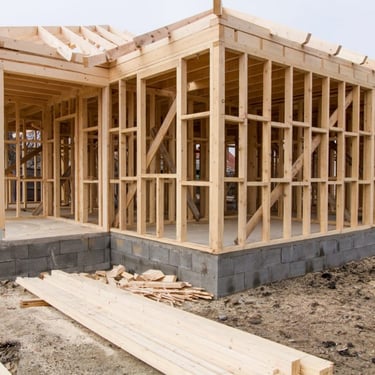
In a connected neighborhood, the strength of the community lies in the diverse skills and experiences of its residents. Whether it’s the local mechanic who keeps our cars running, the gardener who brings beauty to our yards and vegetables to our kitchens, or the medical professional ready to lend a hand in a emergency, each individual plays a vital role. Writers share their stories, social media experts help amplify community events, and ham operators keep us connected during emergencies. Those with extensive camping gear foster outdoor adventures, while the organizational guru helps coordinate activities and resources. Meanwhile, the neighborhood cooks share delicious meals that bring everyone together. This tapestry of talents creates resilience, proving that the community thrives not on the efforts of a single person, but on the collective contributions of all its members. Together, they form a support network that enriches each other's lives and strengthens their bonds.
Top left to right: Kitsap Pony Express, Kitsap mosquito Fleet, Neighborhood Learning, Food/supply Prep for delivery
Bottom Left to right: DART (Disaster Airlift Response Teams), Local Energy Production, local food production, community shelter/housing construction.
Food 4 All
The potential rise in food prices is a pressing concern, particularly as increases reach 10%, 20%, or even 50%. Such escalations would challenge consumers' budgets and disproportionately impact low-income families. Moreover, the looming threat of food shortages could exacerbate the situation, with a 10%, 20%, or 50% decrease in available food items on store shelves. These scenarios raise critical questions: At what point does the gradual increase in prices or the decline in availability transition into a full-blown crisis? Food security is undeniably at risk, making it essential to anticipate these challenges and devise effective strategies to mitigate their effects. Ensuring access to affordable and sufficient food is crucial for maintaining societal stability, and understanding the implications of these potential changes can help communities better prepare for the future.
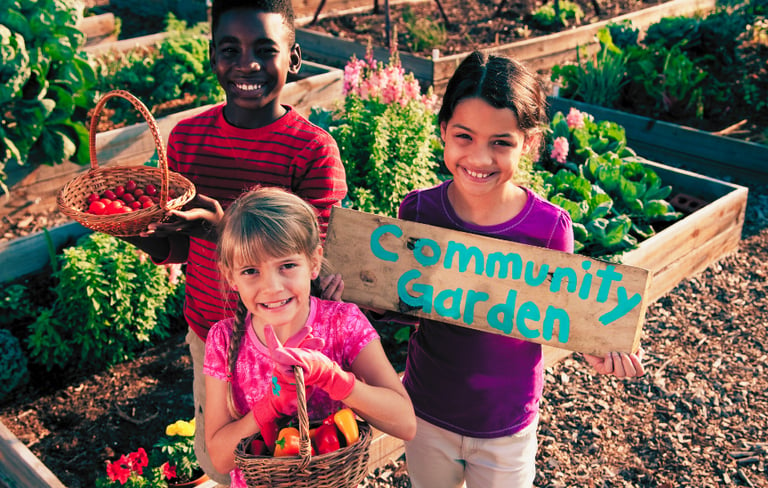

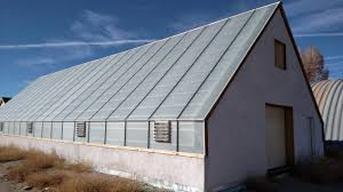



Victory Gardens
Victory gardens, initially promoted between World War I and the conclusion of World War II, served as a crucial means for local food production during times of scarcity. Today, the relevance of these gardens is more pronounced than ever. Our society has shifted towards food delivery systems, heavily processed meals, and fast food, leading many to lose essential cooking skills. While this reliance on convenience is manageable when resources are abundant, it poses a significant risk in times of uncertainty.
As we face potential disruptions in food supply chains, it is imperative that we cultivate a culture of self-sufficiency and resilience. By reintroducing victory gardens into our communities, we can ensure food security for the future, fostering a deeper connection to our food sources and empowering individuals to take control of their nutrition. Transitioning to this sustainable model is a vital step toward safeguarding our food independence.
Grow Centers
In the face of looming food crises exacerbated by conventional commercial agriculture, and Climate Change, the establishment of high-efficiency grow centers represents a vital shift towards a secure food ecosystem. By embracing a permaculture approach, these centers enable a diversity of crops to thrive year-round, significantly mitigating soil erosion and depletion. They prioritize water reduction and reprocessing, while also minimizing transportation routes, ensuring that fresh produce reaches local markets at competitive prices.
This localized food production not only promises a steady supply of food but also fosters job creation and economic growth within regions like Kitsap County. As we witness disruptions in our supply chains, the transition to resilient, community-based food systems becomes increasingly essential!
Power 4 All
The Power 4 All project represents a transformative movement toward decentralized and distributed energy generation through a community-based model. This initiative acknowledges that transitioning to this system is a gradual process, requiring substantial public support to encourage utilities and government entities to embrace these changes.
Microgrids are sophisticated energy systems that seamlessly integrate supply-side and demand-side resources at a low voltage local distribution level. They operate in two distinct modes: in mutual support during normal conditions, the microgrid connects to the larger grid, enhancing stability and reliability. Conversely, in cases of grid emergencies, the microgrid can function independently, entering island operation to ensure an uninterrupted power supply. This self-sufficient system incorporates generation, transmission, distribution, and storage capabilities, allowing it to maintain a local power balance and optimize energy allocation. By utilizing localized resources effectively, microgrids contribute to energy resilience and sustainability, making them a vital component of modern energy infrastructure.
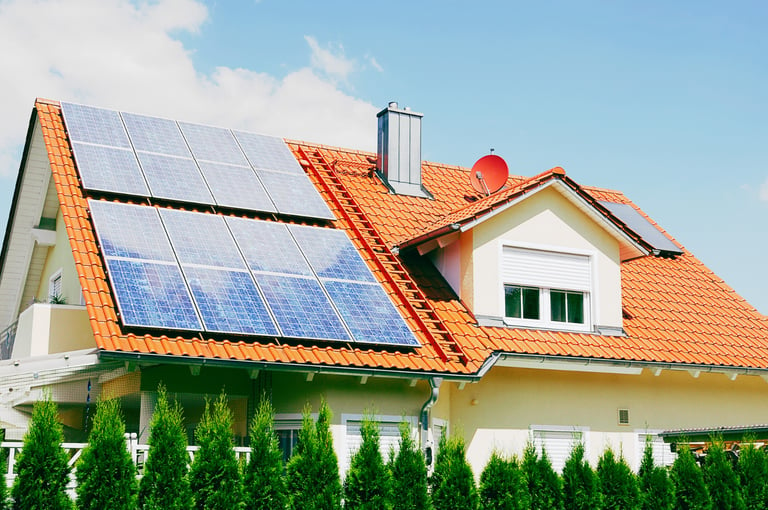

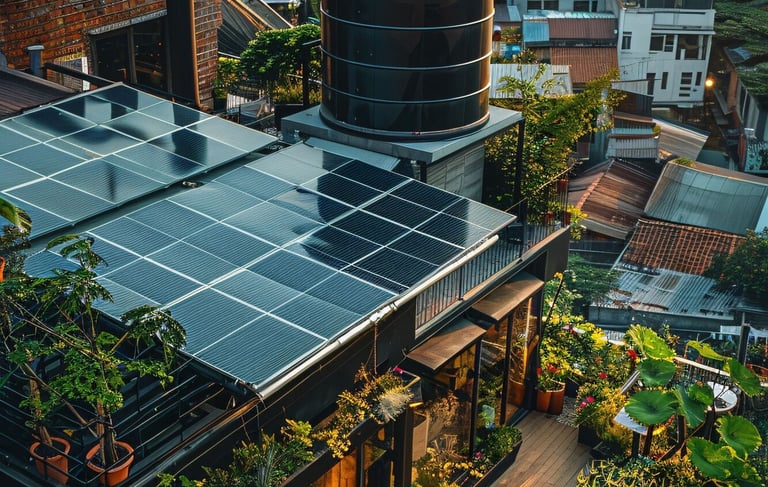

No Silver Bullet
The quest for sustainable energy solutions highlights a fundamental truth: there is no single "silver bullet" capable of wholly replacing traditional energy generation or delivery methods. Rather, effective transformation will necessitate a multifaceted approach, engaging every layer of society—technical, social, political, and corporate. Embracing distributed energy models is essential, as they advocate for a variety of generation sources, which can be effectively managed through microgrids. These localized systems must not only operate independently but also interface seamlessly with the national grid to ensure reliability and efficiency. By fostering this complexity, we can create a resilient energy landscape that adapts to the diverse needs of communities while mitigating the impact of climate change, disaster, and terrorist action and providing a cleaner, more sustainable system for everyone!
Thoughts on Shelter
By prioritizing human needs, we can dismantle the barriers created by cultural othering and work together to forge a future that upholds our shared humanity. Essential elements like food, water, shelter, power, and health must be at the forefront of our efforts. When we recognize these fundamental requirements, we shift our focus from divisive narratives to a collaborative approach that nurtures rather than undermines our existence. Emphasizing these basic necessities fosters unity and compassion, allowing us to build a more equitable and supportive society. Together, we can create systems that not only meet these needs but also empower individuals and communities, ultimately leading to a more harmonious world for all.

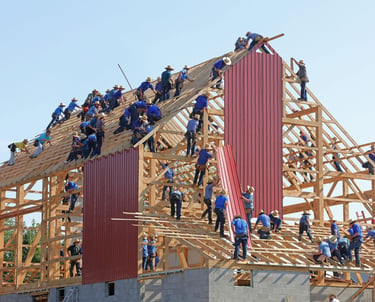
The Amish
In a world where communities unite to provide shelter for the less fortunate, the impact could be transformative. Imagine neighbors coming together, regardless of their backgrounds, to construct safe and affordable housing for those in need. Inspired by the communal efforts of Amish groups, Habitat for Humanity, and Jehovah's Witnesses, these collaborative projects would not only create physical structures but also foster a sense of belonging and support. Each home would be a testament to collective effort, built with care to ensure durability and comfort. Streets lined with houses that tell stories of cooperation, compassion, and resilience would redefine the landscape, offering hope and stability to individuals and families. Such a vision of shared responsibility and community spirit could pave the way for a brighter future, where everyone has a place to call home.
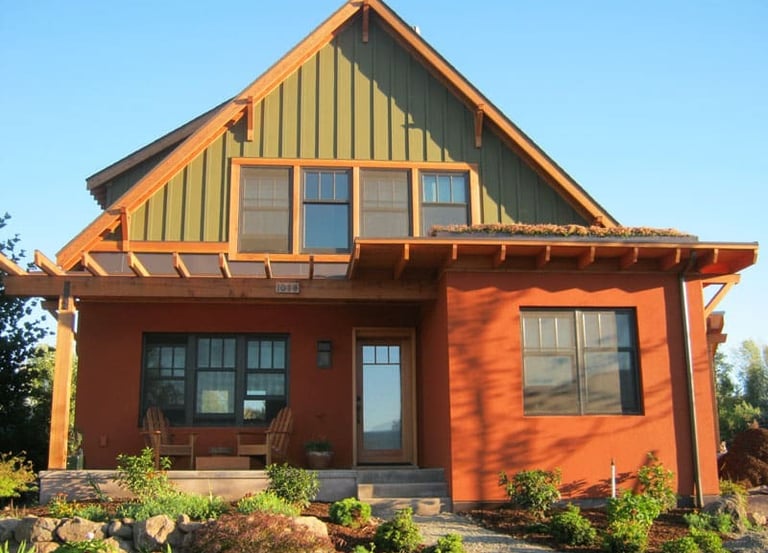

Rethinking Building
As we embark on the journey to establish community shelters, it is crucial to rethink our building practices and the materials we use in response to the challenges posed by climate change. Incorporating renewable energy solutions, such as solar panels and microgrids, alongside energy-efficient appliances and thermal mass construction, can significantly enhance our resilience. These innovations not only reduce our carbon footprint but also minimize health risks associated with conventional building methods. The future is a collective endeavor, and by collaborating and planning today, we can create sustainable environments that prioritize both community well-being and ecological integrity. Together, let's take proactive steps to shape a better tomorrow.
Shelter 4 All
Other Projects
In the vast landscape of creativity and innovation, the potential for new projects is limitless. Every day, countless ideas emerge, waiting to be explored and developed. While our current list of projects may already be extensive, it only scratches the surface of what is possible. There are numerous opportunities that remain hidden, untapped, and overlooked, just waiting for the right moment to be discovered. As we continue to seek inspiration and engage with fresh perspectives, we will inevitably find even more projects that excite our imagination and challenge our abilities. The journey of exploration and creation is endless, and with each new endeavor, we expand our horizons and uncover the richness of possibilities that lie ahead.


Water 4 All
Water is the essence of life, yet a staggering two-thirds of our planet is covered in water, with only a mere 2.5% being drinkable. Despite its scarcity, we often treat this precious resource as though it is limitless, squandering it in ways that are unsustainable. To grasp the severity of the situation, consider that humans can survive for a week without food but only two days without water. Furthermore, the foundation of our food supply relies entirely on water for cultivation. It is imperative that we reevaluate our relationship with water and implement changes swiftly, as the clock is ticking on this critical resource. Only through a collective effort to conserve and respect water can we ensure a sustainable future for ourselves and generations to come.


Connection 4 All
In today’s information age, it is perplexing that our infrastructure remains stuck in the iron age. Despite the advancements in technology, we continue to prioritize profit over genuine investment, resulting in the bare minimum of foundational systems. Our aging power grid serves as a stark example of this type of neglect. With the capabilities of wireless technology at our fingertips, one must wonder why we persist in digging holes in the ground for outdated infrastructure. We have the potential to create a truly connected world, yet we cling to antiquated methods that fail to meet the needs of our modern society. It is high time we rethink our approach and invest in the innovative solutions that could propel us into a new era of connectivity and efficiency.







Coming Soon: Transportation 4 All!!!
Join the Movement!
As we extend our hand to you, we invite you to join us on an essential journey towards a more human future. This vision is grounded in the belief that every individual deserves access to basic human needs, including food, shelter, water, and power. Together, we can create a world where these necessities are not luxuries but fundamental rights for all. By uniting our efforts, we can foster communities that prioritize resilience and compassion, ensuring that no one is left behind.
Let us embark on this transformative path, working collaboratively to build a society that nurtures and uplifts everyone, paving the way for a brighter tomorrow. Your participation is vital; together, we can make this vision a reality. Join us as we strive to redefine what it means to live in harmony with one another and our planet.
Contact
info@reseco.org
How you can support the work?
At Resilient Ecosystems, we recognized the pitfalls of chasing funding at the expense of our core mission early on. Many non-profits fall into the trap of prioritizing financial support over their foundational goals, which can ultimately undermine their purpose. To counter this, we made a conscious choice to self-fund our initiatives primarily through direct donations, simultaneously cultivating a network of subscribers who benefit from our work. This approach not only empowers us to stay true to our mission but also enables us to expand our efforts and increase our impact. By focusing on sustainable funding sources, we can maintain our commitment to creating resilient ecosystems while fostering a growing community of support.
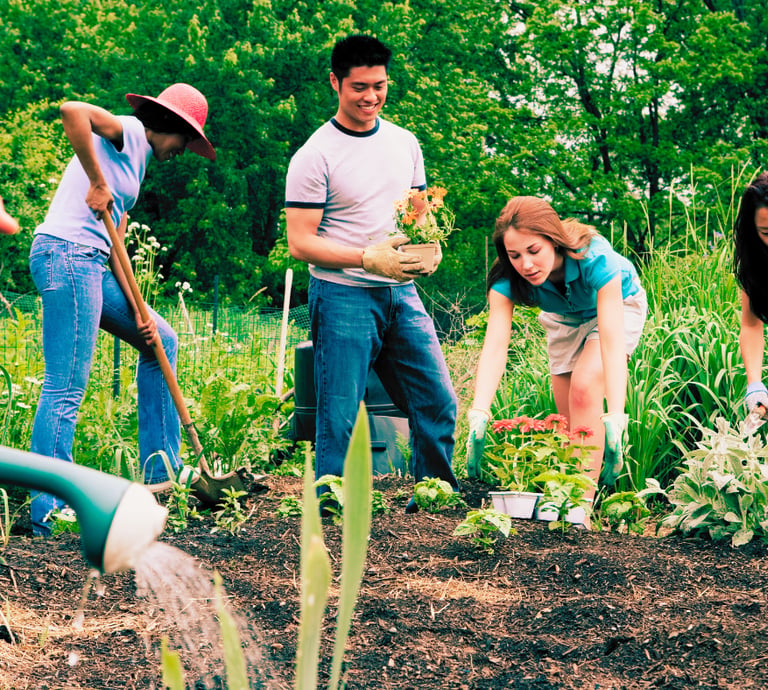

At Patreon, we have chosen a unique approach to subscription support that focuses solely on the value of the work you are backing. While we do not provide merchandise or exclusive content on this platform, our gratitude is expressed through the quality and dedication we put into the projects you are helping to bring to life.
Thank you for being an integral part of our journey!
The Resilient Community Movement
In today's ever-changing world, the importance of fostering resilience within neighborhoods and communities cannot be overstated. By facilitating connections among residents, we empower individuals to share their stories and experiences, creating a strong support network. This collaborative spirit not only enhances the well-being of community members but also amplifies their voices, ensuring that their unique human needs are recognized and addressed.
Contact and Connect
info@reseco.org
© 2024. All rights reserved.
